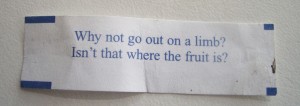If You Really Want Something, Don’t Ask For It
That’s right, don’t ask for it.
But that goes against this blog’s near evangelical belief in the value of questions, you say!
You can’t get something if you don’t ask for it, you say!
Katie, you’ve finally gone off the deep end, you snicker.
But I mean it. If something is really important to you, don’t ask for it.
Demand it.
Questions are great for gathering information and they are an important tool for any negotiator. If you can wield a question with finesse, you can control the negotiation without their realizing it.
But, like all good things, questions have their time and place. If you use them inappropriately they can be more harmful than you think.
Questions are fantastic tools to gather information and test out options.
Questions are shite for getting what you want.
And when I say “shite” I mean: if you really don’t want to budge on something don’t start the conversation off with a question because it suggests you’re perfectly OK if they say “no.”
Bad Question #1: “How does $75/hour sound?”
Answer: It sounds like I can get you to go much lower without pushing too hard.
When talking about your rates, don’t pose them as a question. Your rates aren’t questionable. They are the compensation you need to do the work that you are being asked to do.
Other ways of talking about your rates that are perfectly acceptable and no one will yell at you for:
“I can do that for $75/hour.”
“My minimum for that type of work is $75/hour.”
“My rate is $75/hour and includes x, y and z.”
X, y and z, by the way, are not extra things. They are the things you do already, you’re just listing them so the client knows what a fantabulous deal they’d be getting if they hired you.
Bad Question #2: “Would it be possible if….”
Answer: Eh, depends on my mood.
If you need something, you should say that you need it. Asking if something is “possible” or “likely” or “within any realm of possibility on any spectral plane” suggests that you realize it might not be. And that you’ve thought of that possibility and are OK if the answer is “no.”
“But Katie,” you’re screaming at your monitor, “what if I really don’t know if it’s possible? What if I need to find out if they can do the thing??”
If you need it, you need it. If they can’t do it, they’ll tell you.
Your job isn’t to make them feel better about the things they can’t do. Your job is to tell them what you need so you can do the work you promised them you could provide.
So instead of
“Would it be possible to delete this section in the contract that says I’m liable if you get sued, ever, for anything?”
Try
“I need the following changes to the contract and I’ll be ready to sign it.”
Bad Question #3: “Could you…?”or the popular variant in non-question form, “It would be great if you could….”
Answer: Aren’t you the one who is supposed to be doing things for me?
When clients hire you they don’t always realize that they play an important role in making sure the project is done on time and within their budget. So you need to tell them.
Start early by putting it in the contract with a paragraph entitled “Your Responsibilities” or “Client Responsibilities.” Explain the types of things you’ll need from them to accomplish the work they are hiring you to do. Things like timely delivery of direction, approvals, timely payment, limited revisions, etc.
Then, when you need them to do a thing, just tell them to do it.
And be sure you tell them what will happen if they don’t do it.
“Please provide your approval on the final designs by Friday at 5pm. If I don’t get the approvals by then, we’ll have to extend the deadline for the project.”
“Please sign and return the contract to me. Once I receive the contract, I can start work on your project.”
As with most things freelance, practice makes perfect. It might feel intimidating to tell instead of ask the first few times you do it. But you’ll love not having to haggle and barter over all of the job’s little details.
Featured image by baking_in_pearls via Flickr.com.
Categories: Negotiation Strategy






Thank you. This is very helpful. More power to you. God bless!